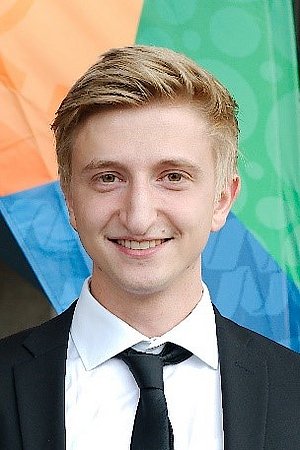Post-doctoral opportunities appear diverse and can develop into very different fields. Many of them remain unnoticed at first. This happened to Dr. Oliver Lampret as well, a biochemist with a PhD and RESOLV alumni. After successfully completing his biochemistry studies at the Ruhr University in Bochum, the natural scientist decided to pursue a PhD as part of the Custer Excellence Program. Like many others, he was faced with the big question after finishing his PhD: Industry or research? In the following interview, he explains how he managed the balance between the two worlds and who actually ensures the safety of our chemicals.
Hello Dr. Lampret, can you briefly outline your scientific career and explain to me what topic you did your doctorate on?
I started my PhD in 2016 in the photobiotechnology group of Professor Thomas Happe and had the opportunity to research enzyme-based biocatalysts for hydrogen production, so-called hydrogenases. The work was initially strongly influenced by biochemical methods and then, in the course of my research, also acquired a solvent-related focus. In cooperation with the physical chemistry department of Professor Havenith-Newen, we were then able to investigate the intermolecular interaction of two proteins based on changes in the hydrate shell.
Can you also use your knowledge for your current place of work or what issues are you dealing with at the moment?
I am currently working in a completely different environment. I am a scientific expert at the Bundesanstalt für Arbeitsschutz und Arbeitsmedizin (BAuA) in Dortmund. Instead of basic research, the focus is now mainly on regulatory issues. One example would be how chemicals and biocides are brought onto the market safely and how they are regulated. This regulation is an important point in order to avoid an uncontrolled spillover of hazardous products. By doing so, we ensure the lowest possible risk to human health and the environment. In that sense, I've gone from regulating proteins to regulating chemicals.
Can you give a specific example of what exactly you do there?
Especially in summer we often experience small insect plagues. Almost everyone encountered it already on his balcony or on vacation, when you are infested by uninvited guests such as mosquitoes or wasps. Remedy creates here then for example a biocide, which one can buy in the drugstore or in the supermarket. Currently, I deal with the approvement of these products and regulate them through our approval processes. In this way, we ensure that such products have as little as possible or no risk potential at all for the environment, humans and animals.
What influence did RESOLV have on your current work? Is there any connection or is it completely unrelated to your current field of activity at the BAuA?
From a scientific point of view, there are no more relations. However, RESOLV was much more than just science. Above all, it was about knowledge transfer within different working groups and topics. An important key competence that I was able to acquire was communication skills. In my current job, I have to communicate with companies, EU bodies, and various regulatory agencies and coordinate complex issues. From this perspective, RESOLV has had a very strong influence on me.
What excites you most about your work at the moment? What do you find particularly exciting?
I am very enthusiastic about the complex issues and the enormous multilayered topics. You have to have a very good overview. I am working on many exciting topics, in particular those that are relevant to society. Especially with regard to the Green Deal, which also involves a chemicals sustainability strategy, to which more or less everyone in the EU has signed up. For me personally, it's important to get up in the morning and know that I can do something good for society by indirectly contributing to a sustainable chemical strategy. That excites me and ultimately gives me a better feeling than doing very technically restrictive research. Which was a lot of fun on the one hand, but probably couldn't fulfil me for a whole lifetime.
Finally, is there any advice you would like to give to young doctoral students or postdocs with regard to their academic or even industrial careers?
In the course of your studies, you will always hear gloomy predictions that you will not have good chances to position yourself on the job market. As a well-trained natural scientist, especially due to the development opportunities through the RESOLV program, there is definitely a wide range of activities that you can pursue. It is best to be open to all professions and not limit yourself too much. You should be aware of what you want to do in the end and then it will work out.
------------------------------------------------------
About the author



